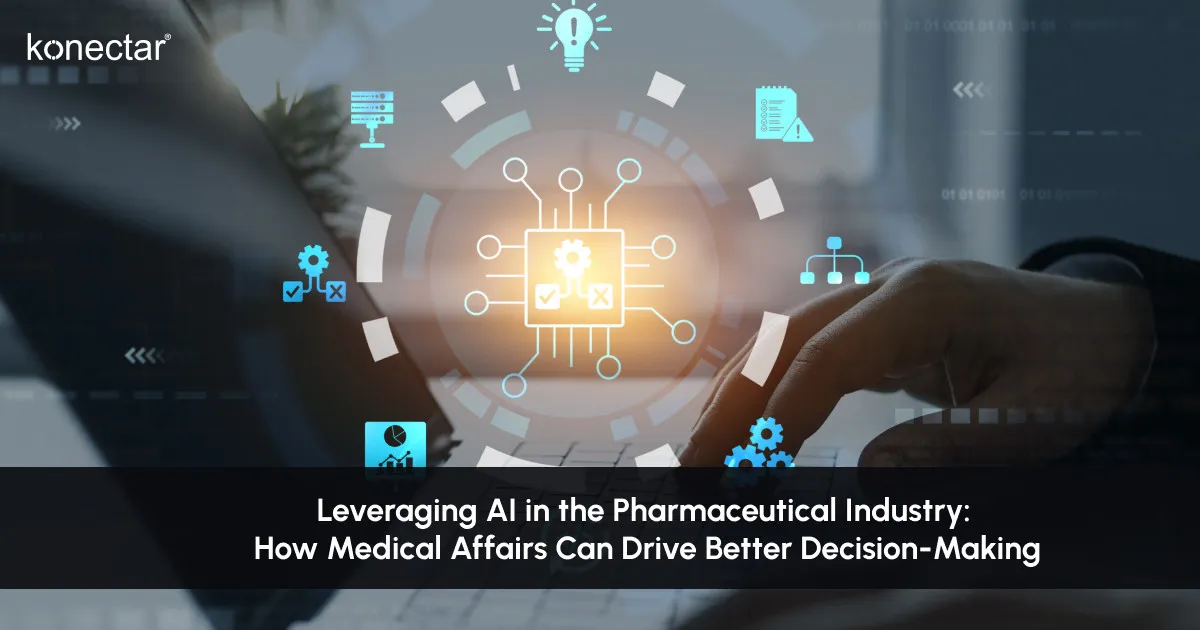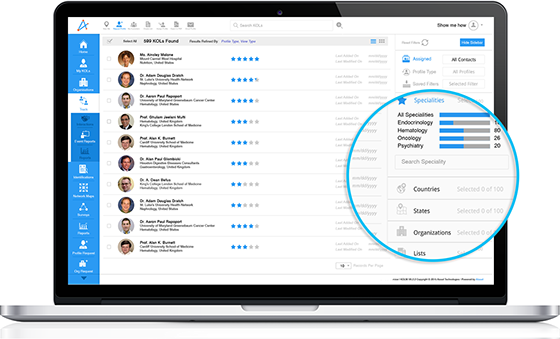20-05-2025
Leveraging AI in the Pharmaceutical Industry: How Medical Affairs Can Drive Better Decision-Making

AI in the pharmaceutical industry is no longer some futuristic concept, in fact, it’s becoming part of the daily toolkit for many pharma teams, especially in Medical Affairs. With responsibilities that bridge science, clinical practice, and healthcare communication, Medical Affairs professionals are increasingly leaning on AI to gain efficiency and clarity in an ocean of data.
Here’s the perspective: When you are bombarded with thousands of new studies, regulatory updates, and evolving clinical guidelines, how do you keep up and stay relevant to healthcare professionals (HCPs)? That’s where AI steps in. From making sense of real-world evidence to enhancing medical communications, AI has a lot to offer. But how exactly can it be used? And what are the real benefits, beyond the buzzwords? Let’s unpack that.
In this article:
Why AI in the Pharmaceutical Industry Matters, Especially Now
In recent years, we have seen a massive uptick in the volume of healthcare data. Whether it’s clinical trials, electronic health records, patient-reported outcomes, or safety data, the industry is drowning in information. And here’s the twist, having data isn’t the same as using it well.
This is where healthcare data analytics, powered by AI, is changing the game. For Medical Affairs, the ability to process, interpret, and act on this data quickly is crucial. Imagine cutting down hours of manual literature reviews, accessing a ready list of HCPs for potential engagement or gaining real-time insights into how patients respond to therapies, all through intelligent systems.
Practical AI Applications in Medical Affairs
We often hear the phrase "digital transformation" tossed around. But in Medical Affairs, digital innovation in pharma isn’t just about adopting tools, it’s about rethinking how you can apply those in reality. Let’s look at a few real-world ways AI is quietly reshaping how Medical Affairs teams operate:
1. AI for Clinical Decision Support
AI tools can now help identify relevant studies, compare treatment options, and even suggest patient-specific interventions. For Medical Science Liaisons, having access to such decision support platforms means they can offer more value-driven conversations with HCPs, based on facts, not assumptions.
2. Generative AI in Pharma Content
Medical writing often eats up a lot of time, summarizing studies, creating slide decks, responding to queries. Generative AI in pharma is now streamlining this. These tools can draft scientifically sound content that teams can refine and use, helping speed up communication cycles without compromising quality.
3. Predictive Analytics in Medicine
When launching a new product or analyzing an existing one, predictive analytics helps Medical Affairs foresee challenges - be it patient adherence, expected outcomes, or safety risks. This kind of foresight helps shape smarter medical strategies and supports cross-functional planning.
4. AI-Powered Medical Insights from Real-World Evidence
Sifting through real-world evidence in healthcare can be like finding a needle in a haystack. AI can help cut through the noise, identifying trends, unexpected side effects, or therapeutic patterns that may not be obvious to the human eye.
5. Unlocking Actionable Insights with AI-Powered Tools
From understanding HCP behavior to tracking the scientific share of voice, and analyzing social media discussions around key medical topics, AI brings clarity to complex and unstructured data. Platforms like konectar offer a suite of professional services that simplify this process. Life science teams can leverage ready-to-use reports enriched with meaningful intelligence to take their objectives forward.
Whether it’s tracking KOL engagement, benchmarking scientific share of voice, analyzing gap in publications, konectar equips Medical Affairs with the data they need to stay ahead.
All this automation doesn’t replace Medical Affairs professionals. it frees them to spend more time on strategic thinking and stakeholder engagement.
Looking Ahead: The Future of AI-Driven Healthcare Strategies
So where do we go from here? The potential of AI-driven healthcare strategies is enormous. We are moving toward a future where real-time AI recommendations enrich every HCP interaction. They ensure conversations are relevant, timely, and backed by the latest evidence.
Generative AI will create customized materials for each engagement, whether it’s for a one-on-one meeting or a virtual roundtable. KOL engagement will also see a transformation, as AI identifies rising experts, tracks sentiment and influence across scientific platforms, and personalizes outreach based on past interactions and specialty focus.
It will also help monitor long-term therapy outcomes in real-world settings. Teams will increasingly use methodologies that turn data into insights faster than ever before. What once took years to uncover will now take months, empowering Medical Affairs to act with greater agility and impact.
FAQs
- Is generative AI safe for medical communications?
Yes, when used with proper validation and compliance, generative AI helps speed up and improve communication quality.
- What is real-world evidence in healthcare, and how does AI help?
Real-world evidence includes patient experiences outside trials. AI can process this data quickly to guide decisions and strategy.
- Will AI replace Medical Affairs professionals?
Not at all. While AI can be a great support tool, it can’t replace the human touch that Medical Affairs brings to the table. This field relies heavily on empathy, critical thinking, and making sense of complex medical data in real-world contexts, things that still need a human mind and heart.





